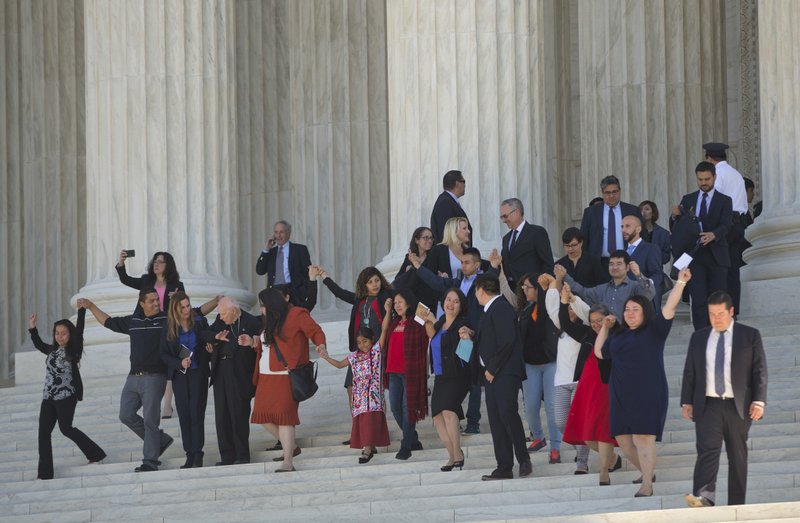WASHINGTON -- The Supreme Court on Monday heard sides in an extended argument over a challenge to President Barack Obama's plan that would shield millions of illegal immigrants from deportation and allow them to work in the country legally.
RELATED ARTICLE
http://www.arkansas…">Arkansans in D.C. rally for pullback on deporting
As hundreds of pro-immigration demonstrators and a smaller number of opponents filled the sidewalk outside the court, the justices had sharp questions for both sides in a case that pits Republican governors and members of Congress against the Democratic administration.
Obama's administration is asking the justices to allow it to put in place two programs that could shield roughly 4 million people from deportation and make them eligible to work in the United States.
Texas is leading 26 states, including Arkansas, in challenging the programs that Obama announced in 2014 and that have been put on hold by lower courts. Those states say the administration usurped power that belongs to Congress.
"It's as if ... the president is setting the policy and the Congress is executing it. That's just upside down," Justice Anthony Kennedy said.
Chief Justice John Roberts also aggressively questioned Solicitor General Donald Verrilli Jr., suggesting there are few limits to the president's power under the administration's view of immigration law.
"Under your argument, could the president grant deferred removal to every ... unlawfully present alien in the United States right now?" Roberts asked.
"Definitely not," Verrilli said.
The programs would apply to parents of children who are citizens or are living in the country legally. Eligibility also would be expanded for the president's 2012 effort that applies to people who were brought here illegally as children. More than 700,000 people have taken advantage of that earlier program. The new program for parents and the expanded program for children could reach as many as 4 million people, according to the nonpartisan Migration Policy Institute.
For the parents of citizens or legal permanent residents, their children would have to have been born before Nov. 21, 2014 -- the date of Obama's recent executive action -- and the parents would have to have been in this country the day before. They also would have to have lived in the United States since at least Jan. 1, 2010, and they'd have to pay taxes to win the reprieve.
For children brought here illegally, they would have had to have arrived before Jan. 1, 2010 and before their 16th birthdays. They also would have to be in school, have graduated or earned a GED or have been honorably discharged from the military.
The case could end in a 4-4 tie because of Justice Antonin Scalia's death in February. That would leave the programs in limbo, almost certainly through the end of Obama's presidency.
Both sides acknowledge that the outcome of the presidential election ultimately could determine the programs' fates, even if the Supreme Court rules for the administration. Republican candidates have pledged to roll back Obama's actions.
Several justices remarked how Congress provides enough money to deport only about 400,000 people annually.
The bulk of immigrants who live in the U.S. illegally "are here whether we want them or not," Justice Sonia Sotomayor said.
Justice Ruth Bader Ginsburg said that "inevitably priorities have to be set" about how to handle them.
The arguments indicated that the fate of the programs could hang on a two-word phrase the administration used to describe the status of immigrants under the programs -- lawful presence. Texas and congressional Republicans who back the state say the phrase is important because it gives the immigrants more rights than federal law allows.
"How is it possible to lawfully work in the United States without lawfully being in the United States?" asked Justice Samuel Alito during the argument.
Verrilli told the justices that they could get rid of the phrase and essentially leave the programs unchanged.
Republican governors and members of Congress have argued that Obama doesn't have the power to effectively change immigration law.
The administration and immigration advocates say Obama's orders are neither unprecedented nor even unusual. Rather, they say, the programs build on past efforts by Democratic and Republican administrations to use discretion in deciding whom to deport.
Information for this article was contributed by Mark Sherman of The Associated Press; by Greg Stohr and Laurie Asseo of Bloomberg News; and by Max Ehrenfreund of The Washington Post.
A Section on 04/19/2016


